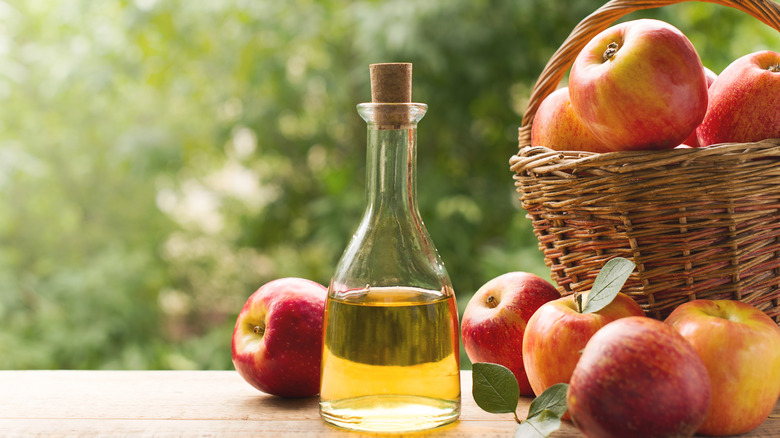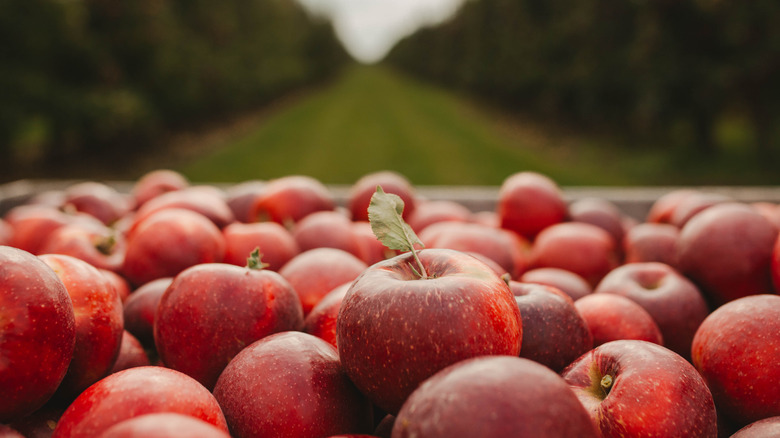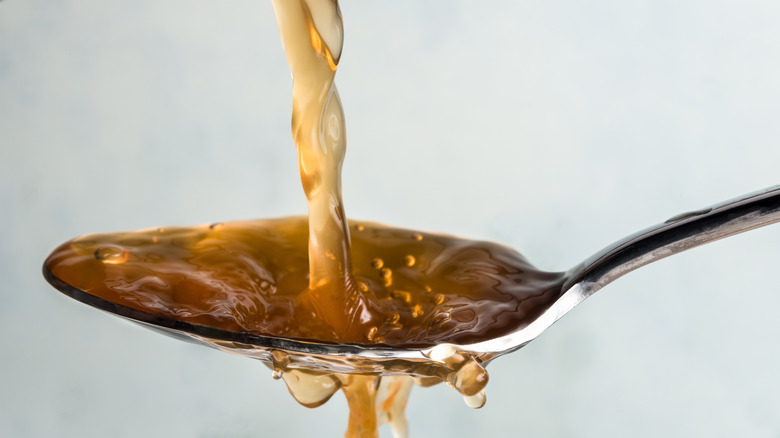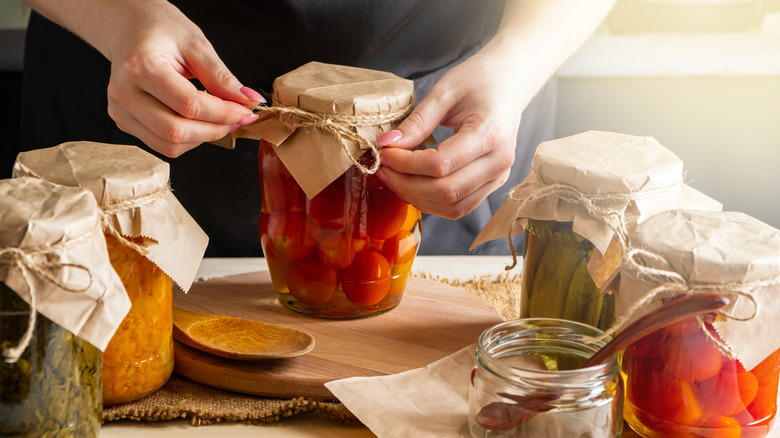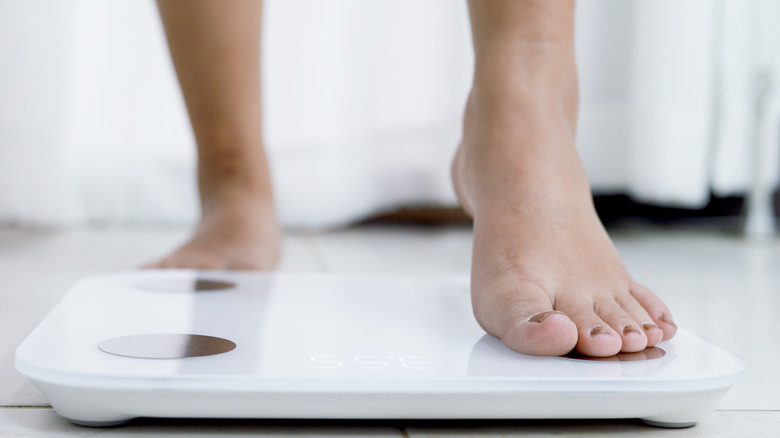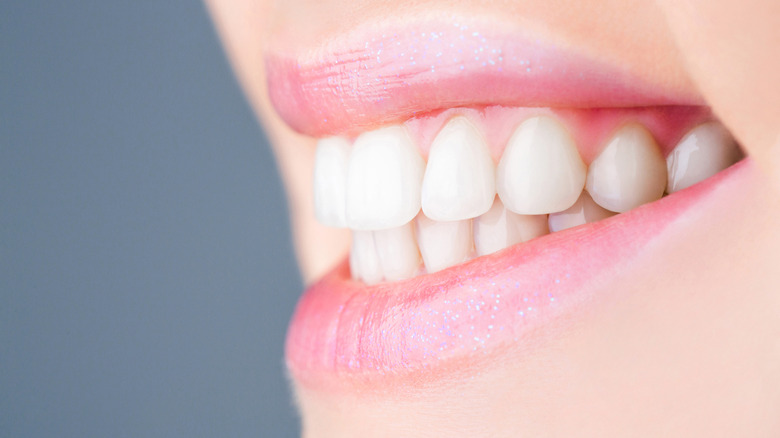Everything You Wanted To Know About Apple Cider Vinegar
It seems as if every time you turn around, there's another everyday product that people are touting as the solution to all kinds of health woes. Among the many potential miracles you probably already have around your house is apple cider vinegar. It's a fruity, tangy solution you keep in your kitchen cabinet, but if you're like most people, you might not be exactly sure what to do with it.
As it turns out, you can do a lot with apple cider vinegar — everything from adding flavor to food to cleaning your house to rinsing out your hair. While not every touted benefit of apple cider vinegar is backed by science, in some cases there's enough information available to support claims you might have heard. So it's time to pull out your bottle of apple cider vinegar and get ready to make good use of it. Here's an in-depth look at everything you should know about apple cider vinegar.
Apple cider vinegar is fermented apple juice.
The name apple cider vinegar is pretty self-explanatory — this is a vinegar made from fermented apple cider. The process starts with apples that are crushed down to make the pulpy juice so many of us associate with autumnal weather. Then it's time to let it ferment. The Cleveland Clinic explains that this fermentation process involves combining a type of carbohydrates — usually yeast or sugar — with the apple juice. Over time, those carbohydrates are changed via exposure to natural bacteria, and they turn into alcohol. That alcohol then becomes what's known as acetic acid, the component that gives vinegar its sharp, distinctive taste.
According to the Harvard School of Public Health, vinegar might range anywhere from 4-8% acetic acid (the Food and Drug Administration requires a product to have at least 4% to be classified as vinegar). Apple cider vinegar is on the lower end of the acidity range, consisting of about 5-6% acetic acid (via Reader's Digest). The rest of it is water.
You should look for unpasteurized apple cider vinegar.
You might notice that some of the apple cider vinegar on the market is specified as either "raw" or "pasteurized" (via Eat This, Not That!). And you're left wondering which one you're supposed to choose. You might be a little more inclined to go for pasteurized because, hey, you associate pasteurized foods with being safe and healthy, right? But that's not necessarily best in the case of apple cider vinegar.
Pasteurized apple cider vinegar has been put through a heat process that kills all the natural bacteria in it, whereas raw apple cider vinegar has not been heated and has retained its bacterial content. As Eat This, Not That! explains, the raw, unprocessed, unfiltered apple cider vinegar offers more health benefits in the form of not only beneficial bacteria (more on those in a bit), but also in the form of enzymes and proteins. While most labels will tell you whether a bottle of apple cider vinegar has been processed with heat, you can also just pay attention to the appearance of the vinegar itself. Raw apple cider vinegar often has what's known as the "mother" — sediment floating in the liquid that gives the apple cider vinegar a murky appearance.
Even the unpasteurized kind of apple cider vinegar can be stored unrefrigerated without any worry of spoilage. The high acid content will stop the bad kind of bacteria from growing in it. However, you should take care to keep it in a cool dark place with the cap tightly screwed on, and it will keep for up to two years.
Apple cider vinegar is a source of probiotics.
So now let's talk about those bacteria that are living in your apple cider vinegar. Don't let the thought ick you out — these are the good kind of bacteria, the natural kind that already exist in your digestive tract and help boost your health. Livestrong explains that these bacteria, which are formally known as probiotics, are often found in fermented foods like vinegar. That's why apple cider vinegar can be a real boost to a healthy diet — when you take in this vinegar, you are also taking in plenty of probiotics to help you fight gastrointestinal problems like diarrhea and irritable bowel syndrome. Probiotics might also help fight conditions like high cholesterol and obesity.
This is another reason it's important to choose raw apple cider vinegar — the high heat from the pasteurization process kills these beneficial bacteria, so you won't see any of these health benefits with the pasteurized version. That said, it's important to bear in mind that, whether raw or pasteurized, apple cider vinegar isn't a miracle solution to cure health problems.
You can use apple cider vinegar for preserving food.
Here's a fun kitchen project for you: Apple cider vinegar can be used for preserving foods through pickling (via CNN). Thanks to the antimicrobial aspects of acidic vinegars, they can be used to extend the life of certain foods and give them a tangy, salty, biting flavor. Typically, most people pickle their foods using white vinegar, because white vinegar has lighter color and much milder flavor. On the other hand, apple cider vinegar can be an adventurous culinary choice — immersing fruits and vegetables in apple cider vinegar will give them a darker color and add a slight fruity edge to the distinctive bite that pickled products have.
Food Print explains that pickling foods is great not only for your health, but also for the health of your wallet and the environment. This is because you're extending the life of food that otherwise would spoil and go to waste. You can create a pickle bath by combining three parts vinegar to two parts water and one part sugar. Apple cider vinegar works well with caraway seeds and dill seeds to season the pickle juice. Don't be afraid to use vegetables other than cucumbers. Cabbage, squash, root vegetables, cauliflower, and other items from a garden or farmer's market can be pickled in apple cider vinegar.
Apple cider vinegar might help with weight loss.
Though apple cider vinegar is definitely not a weight-loss miracle, a clinical trial published in the Journal of Functional Food suggests that it may be a helpful part of a holistic weight-loss plan. The study followed two groups of people on a reduced-calorie diet. One of the groups had 1 tablespoon of apple cider vinegar with lunch, then another 1 tablespoon with dinner (via University of Chicago Medicine). The other group had no apple cider vinegar. By the end of a 12-week test period, the group that had apple cider vinegar with their meals had lost an average of 8.8 pounds compared with the other group that lost an average of 5 pounds. While that difference is modest, the researchers did conclude that apple cider vinegar contributed to weight loss, possibly because apple cider vinegar has the ability to lower a person's appetite.
Apple cider vinegar could help or hurt your stomach.
A little bit of apple cider vinegar might make your stomach feel better. But too much of it? Well, you could be looking at a really bad stomachache. If you have acid reflux, you might have heard a rumor that apple cider vinegar can help mitigate your condition thanks to its probiotic content that also helps with diarrhea and irritable bowel syndrome. The scientific research isn't there to support these claims, but according to a gastroenterologist Dr. Maged Rizk, talking to the Cleveland Clinic, there's no harm in giving this method a try. Rizk recommends starting with a small amount of apple cider vinegar — no more than 1 teaspoon. Combine it with a cup of warm water and sip it like tea after a meal. This method carries very little risk, and if it makes you feel better ... well, that's what counts, right?
But don't get carried away. Eat This, Not That! cites a study from the International Journal of Obesity that followed test subjects who consumed a drink made from apple cider vinegar with breakfast. Those test subjects ended up dealing with nausea and indigestion — not something any of us are looking to experience, especially if you're already prone to acid reflux or other digestive upsets.
Apple cider vinegar can help control blood sugar levels.
Managing blood sugar levels can be a constant struggle for people with diabetes (via Everyday Health). And there's a chance that the inclusion of a little bit of apple cider vinegar might make a positive difference for people with that condition. According a study published by the American Diabetes Association, a group of participants (some of whom were insulin resistant, some of whom were insulin sensitive, and some of whom were diabetic) were served a high-carbohydrate meal consisting of a white bagel, butter, and orange juice for a total of 87 grams of carbohydrates. Additionally, these test subjects consumed either a beverage made with apple cider vinegar or a placebo drink. The result was that those who drank the apple cider vinegar had better blood sugar levels. University of Chicago Medicine (UCM) cites this study, and notes that other research supports this same conclusion. However, UCM emphasizes that apple cider vinegar isn't intended to serve as a person's only way of managing diabetes. Drinking some apple cider vinegar might help, but it's not as effective as medication or a formal treatment plan.
It's an all-natural, nontoxic cleaning product.
We all love a squeaky-clean house. Unfortunately, some of those toxic cleaning products on the market can make our home feel grosser than it did before we gave it a deep clean. Just think of all the chemicals! If you're concerned about undesirable ingredients that might be lurking in your cleaning products, you'll be happy to know apple cider vinegar can be used as an all-purpose cleaner that's all natural and non-toxic (via Mind Body Green). So if it comes into contact with your skin while you're scrubbing, or your pets or toddlers lick it while the kitchen floor is still damp, there's no need to stress out.
Apple cider vinegar can be used for a variety of purposes around the home. Dilute it with water and keep it in a spray bottle so you can use it to wipe down a germy kitchen counter. You can also use a diluted mixture to clean your windows, de-stain the browned inside of your favorite coffee mug, and remove mildew and soap scum. Apple cider vinegar can even be used to sanitize a cutting board, and when combined with baking soda, it will de-gunk a slow-draining sink or bathtub drain.
It's good for cleaning your hair (but maybe not your skin).
It's not just the surfaces in your kitchen and bathroom that will benefit from the cleaning power of apple cider vinegar — this is an all-natural product that can also provide perks for your hair. Mind Body Green explains that apple cider vinegar has become the latest trend in hair care because it restores your hair's natural pH levels, which can be thrown off by the alkaline nature of typical shampoos. Mix a half-tablespoon of raw, unpasteurized apple cider vinegar with 1 cup of cold water and store in an empty shampoo bottle. Use this mixture to rinse your hair whenever you wash it, and watch your hair return to its healthy pH levels again.
However, you shouldn't count on apple cider vinegar to offer the same benefits for your skin. Healthline points out that apple cider vinegar's acidity might be known for killing bacteria, but there's no scientific evidence to show it kills the bacteria that causes acne. More importantly, apple cider vinegar is too strong to be applied undiluted to your skin.
You can use apple cider vinegar to make deodorant.
If you're somebody who sweats heavily, your armpits can get pretty gross on hot days or during an intense workout session. And while deodorant definitely helps with the smell, you might be a little wary of the long list of ingredients on the container. If you'd prefer a more natural solution, you can easily make one with apple cider vinegar, as its microbial aspects will kill the bacteria that breed in sweat and cause body odors (via Well + Good).
Well + Good explains that you can mix a half-teaspoon of unpasteurized apple cider vinegar with a half-teaspoon of bentonite clay, which comes from volcanic rock beds and is good for absorbing toxins from your skin. The apple cider vinegar, being a liquid, serves to activate the bentonite clay so it can absorb toxins the way it should. When you've mixed the equal parts of clay and vinegar together, apply the resulting paste to your underarms and allow it to set for up to a half-hour before rinsing the mixture off. This will help curb any armpit stink you might be dealing with.
Apple cider vinegar can help ease menstrual cramps.
Apple cider vinegar might not be a typical food when it comes to period cravings, but it could be one of the best things to consume when it's that time of the month — indeed, Days for Girls lists apple cider vinegar as a way of managing menstrual cramps right up there with yoga, bananas, ginger, and comfortable heat. But why apple cider vinegar? Well, because of its potassium and calcium content. These electrolytes are vital for making sure your muscles don't cramp up, and that includes the muscles in your uterus that are hurting so badly during your period. Elite Daily explains that this is why vinegar is sometimes also used by athletes whose vigorous training might lead to muscle cramps. To consume it, Days for Girls and Elite Daily both suggest combining apple cider vinegar with hot water and drinking it like a tea. You can add a little flavor like ginger if that will help it go down.
The acidity isn't so great for your teeth.
Sure, it's great for restoring your hair's pH and combatting your body odor, but apple cider vinegar is unfortunately pretty bad for your dental health. This is due to apple cider vinegar's high acid levels, which can break down tooth enamel during prolonged exposure. For instance, Eat This, Not That! cites a scientific study published by Clinical Laboratory in which human wisdom teeth were left to soak in vinegar. After four hours, the teeth had been degraded by the acidity, and some of them had lost as much as 20% of their minerals.
It might make you uneasy to think of your teeth disintegrating like that, but bear in mind that this study doesn't necessarily reflect what's going on in your mouth — just what vinegar has the potential to do in certain controlled situations. Unless you're planning to hold a mouthful of apple cider vinegar for four hours straight, you probably don't have to worry too much. Still, it's good to be aware that you might want to brush your teeth after eating anything soaked in vinegar.
Apple cider vinegar can be used as a salad dressing.
Even if you subscribe to all the health benefits that apple cider vinegar has to offer when you drink it, the notion of actually swallowing a big gulp of acidic vinegar doesn't sound too appetizing. That's okay! You can still reap the benefits of apple cider vinegar simply by including it in some of your favorite recipes, and a salad dressing is one of the easiest ways to do that. The Harvest Kitchen offers an easy-to-follow (and easy-to-adapt) recipe for apple cider vinaigrette using olive oil, lemon juice, Dijon mustard, dried oregano, garlic, salt, and pepper — and, of course, apple cider vinegar. Once you have a batch of the vinaigrette made up, you can store it in your refrigerator and use it to dress up a favorite salad. As a health bonus, you might find that the apple cider vinaigrette makes you inclined to eat more vegetables, so you'll be enjoying the boost of vitamins and minerals you get from the salad while you also enjoy the benefits you've come to expect from apple cider vinegar.

